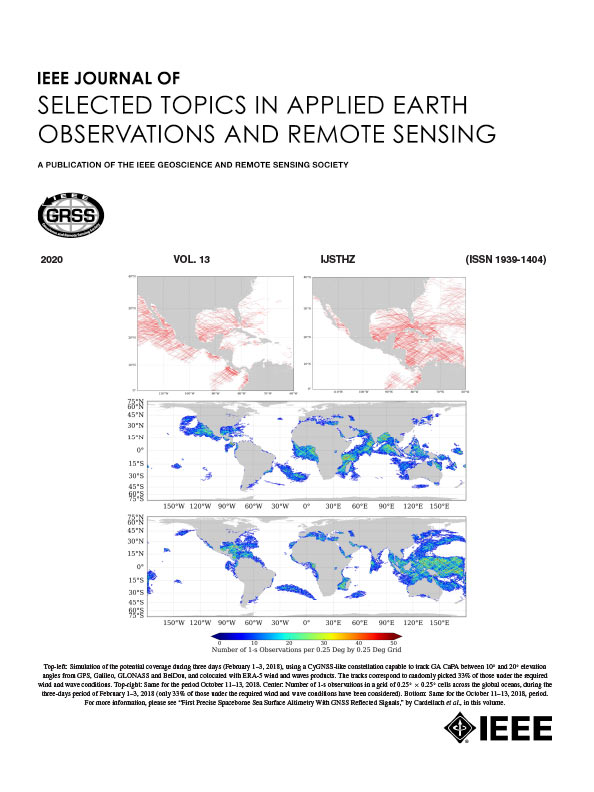遥感图像分类中dnn的对抗鲁棒泛化研究
IF 4.7
2区 地球科学
Q1 ENGINEERING, ELECTRICAL & ELECTRONIC
IEEE Journal of Selected Topics in Applied Earth Observations and Remote Sensing
Pub Date : 2025-04-15
DOI:10.1109/JSTARS.2025.3561254
引用次数: 0
摘要
基于深度神经网络(dnn)的深度学习是遥感图像分类任务的重要技术支撑。但dnn很容易受到对抗性攻击。对抗训练是获得抗此类攻击的鲁棒模型的有效方法之一。然而,许多对抗训练策略只能防御已知攻击,面对未知攻击时表现不佳,即虽然增强了模型的对抗鲁棒性,但降低了模型的泛化能力。为了缓解这一现象,我们提出了一种新的方法,在对抗训练的框架内提高dnn在遥感图像分类中的对抗鲁棒泛化。具体来说,我们对对抗损失函数的梯度施加欧几里得正则化约束,以通过增强干净和对抗样本之间的梯度对齐来缩小鲁棒泛化差距。此外,我们将标签平滑策略纳入对抗训练过程,旨在通过降低模型对细微波动的敏感性来进一步提高模型的对抗鲁棒性。这两种策略的结合不仅可以提高模型的对抗鲁棒性,还可以提高模型的对抗鲁棒泛化能力。最后,以FGSM和PGD两种经典攻击方法为例,在两种常用的遥感图像分类数据集NWPU-RESSC45、RSSCN7和WHU-RS19上进行了大量实验,验证了该方法的有效性和可行性,证明了其优于以往方法,特别是在提高dnn的对抗鲁棒泛化方面。本文章由计算机程序翻译,如有差异,请以英文原文为准。
On Adversarial Robust Generalization of DNNs for Remote Sensing Image Classification
Deep neural networks (DNNs)-based deep learning is an important technical support in the task of remote sensing image classification. But DNNs are susceptible to adversarial attacks. Adversarial training is one of the effective ways to obtain robust models that can against such attacks. However, many adversarial training strategies can only defend against known attacks and perform poorly when faced with unknown attacks, namely, although the adversarial robustness of the model is enhanced, the generalization is reduced. To alleviate this phenomenon, we propose a new method to improve the adversarial robust generalization of DNNs for remote sensing image classification within the framework of adversarial training. Specifically speaking, we impose a Euclidean regularization constraint on the gradient of the adversarial loss function in order to achieve a narrowing of the robust generalization gap by enhancing the gradient alignment between clean and adversarial examples. In addition, we incorporate a label smoothing strategy into the adversarial training process, aiming to further improve the adversarial robustness of the model by reducing its sensitivity to subtle fluctuations. The combination of the above two strategies can not only improve the adversarial robustness of the model but also improve its adversarial robust generalization. Finally, in the case of two classical attack approaches FGSM and PGD, we validate the effectiveness and feasibility of our method through extensive experiments on two commonly used remote sensing image classification datasets NWPU-RESSC45, RSSCN7, and WHU-RS19, demonstrating its superiority over previous methods, particularly in the context of improving the adversarial robust generalization of DNNs.
求助全文
通过发布文献求助,成功后即可免费获取论文全文。
去求助
来源期刊
CiteScore
9.30
自引率
10.90%
发文量
563
审稿时长
4.7 months
期刊介绍:
The IEEE Journal of Selected Topics in Applied Earth Observations and Remote Sensing addresses the growing field of applications in Earth observations and remote sensing, and also provides a venue for the rapidly expanding special issues that are being sponsored by the IEEE Geosciences and Remote Sensing Society. The journal draws upon the experience of the highly successful “IEEE Transactions on Geoscience and Remote Sensing” and provide a complementary medium for the wide range of topics in applied earth observations. The ‘Applications’ areas encompasses the societal benefit areas of the Global Earth Observations Systems of Systems (GEOSS) program. Through deliberations over two years, ministers from 50 countries agreed to identify nine areas where Earth observation could positively impact the quality of life and health of their respective countries. Some of these are areas not traditionally addressed in the IEEE context. These include biodiversity, health and climate. Yet it is the skill sets of IEEE members, in areas such as observations, communications, computers, signal processing, standards and ocean engineering, that form the technical underpinnings of GEOSS. Thus, the Journal attracts a broad range of interests that serves both present members in new ways and expands the IEEE visibility into new areas.

 求助内容:
求助内容: 应助结果提醒方式:
应助结果提醒方式:


